Related Research Articles
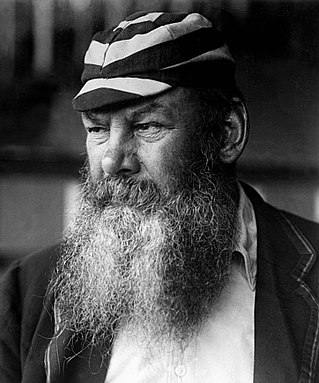
William Gilbert Grace was an English amateur cricketer who was important in the development of the sport and is widely considered one of its greatest players. He was nominally amateur as a cricketer, but he is said to have made more money from his cricketing activities than any professional cricketer. He was an extremely competitive player and, although he was one of the most famous men in England, he was also one of the most controversial on account of his gamesmanship and moneymaking.

James Charles Laker was an English professional cricketer who played for Surrey County Cricket Club from 1946 to 1959 and represented England in 46 Test matches. He was born in Shipley, West Riding of Yorkshire, and died in Wimbledon, London.
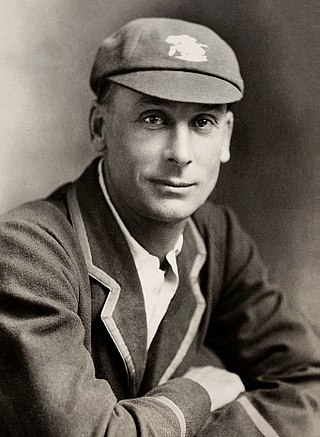
Sir John Berry Hobbs was an English professional cricketer who played for Surrey from 1905 to 1934 and for England in 61 Test matches between 1908 and 1930. Known as "The Master", he is widely regarded as one of the greatest batsmen in the history of cricket. He is the leading run-scorer and century-maker in first-class cricket, with 61,760 runs and 199 centuries. A right-handed batsman and an occasional right-arm medium pace bowler, Hobbs also excelled as a fielder, particularly in the position of cover point. Hobbs was named as one of the five Wisden Cricketers of the Century alongside Sir Donald Bradman, Sir Garfield Sobers, Shane Warne, and Sir Viv Richards.

Frederick Sewards Trueman, was an English cricketer who played for Yorkshire County Cricket Club and the England cricket team. He had professional status and later became an author and broadcaster.

Sir Leonard Hutton was an English cricketer. He played as an opening batsman for Yorkshire County Cricket Club from 1934 to 1955 and for England in 79 Test matches between 1937 and 1955. Wisden Cricketers' Almanack described him as "one of the greatest batsmen in the history of cricket". He set a record in 1938 for the highest individual innings in a Test match in only his sixth Test appearance, scoring 364 runs against Australia, a milestone that stood for nearly 20 years. Following the Second World War, he was the mainstay of England's batting. In 1952, he became the first professional cricketer of the 20th century to captain England in Tests; under his captaincy England won the Ashes the following year for the first time in 19 years.

Walter Reginald Hammond was an English first-class cricketer who played for Gloucestershire in a career that lasted from 1920 to 1951. Beginning as a professional, he later became an amateur and was appointed captain of England. Primarily a middle-order batsman, Wisden Cricketers' Almanack described him in his obituary as one of the four best batsmen in the history of cricket. He was considered to be the best English batsman of the 1930s by commentators and those with whom he played; they also said that he was one of the best slip fielders ever. Hammond was an effective fast-medium pace bowler and contemporaries believed that if he had been less reluctant to bowl, he could have achieved even more with the ball than he did.

Hedley Verity was a professional cricketer who played for Yorkshire and England between 1930 and 1939. A slow left-arm orthodox bowler, he took 1,956 wickets in first-class cricket at an average of 14.90 and 144 wickets in 40 Tests at an average of 24.37.

Sydney Francis Barnes was an English professional cricketer who is regarded as one of the greatest bowlers of all time. He was right-handed and bowled at a pace that varied from medium to fast-medium with the ability to make the ball both swing and break from off or leg. In Test cricket, Barnes played for England in 27 matches from 1901 to 1914, taking 189 wickets at 16.43, one of the lowest Test bowling averages ever achieved. In 1911–12, he helped England to win the Ashes when he took 34 wickets in the series against Australia. In 1913–14, his final Test series, he took a world record 49 wickets in a Test series, against South Africa.

Norman Walter Dransfield Yardley was an English cricketer who played for Cambridge University, Yorkshire County Cricket Club and England, as a right-handed batsman and occasional bowler. An amateur, he captained Yorkshire from 1948 to 1955 and England on fourteen occasions between 1947 and 1950, winning four Tests, losing seven and drawing three. Yardley was named Wisden Cricketer of the Year in 1948, and in his obituary in Wisden Cricketers' Almanack he was described as Yorkshire's finest amateur since Stanley Jackson.

Wilfred Rhodes was an English professional cricketer who played 58 Test matches for England between 1899 and 1930. In Tests, Rhodes took 127 wickets and scored 2,325 runs, becoming the first Englishman to complete the double of 1,000 runs and 100 wickets in Test matches. He holds the world records both for the most appearances made in first-class cricket, and for the most wickets taken (4,204). He completed the double of 1,000 runs and 100 wickets in an English cricket season a record 16 times. Rhodes played for Yorkshire and England into his fifties, and in his final Test in 1930 was, at 52 years and 165 days, the oldest player who has appeared in a Test match.
John Brian Statham, was an English professional cricketer from Gorton, in Manchester, who played for Lancashire County Cricket Club from 1950 to 1968 and for England from 1951 to 1965. As an England player, he took part in nine overseas tours from 1950–51 to 1962–63. He was a right arm fast bowler and was noted for the consistent accuracy of his length and direction.
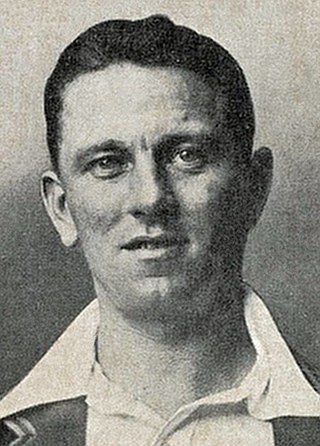
Maurice Leyland was an English international cricketer who played 41 Test matches between 1928 and 1938. In first-class cricket, he represented Yorkshire County Cricket Club between 1920 and 1946, scoring over 1,000 runs in 17 consecutive seasons. A left-handed middle-order batsman and occasional left-arm spinner, Leyland was a Wisden Cricketer of the Year in 1929.
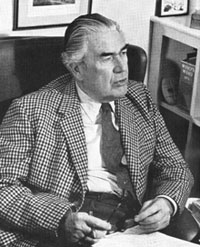
Ernest William "Jim" Swanton was an English journalist and author, chiefly known for being a cricket writer and commentator under his initials, E. W. Swanton. He worked as a sports journalist for The Daily Telegraph and as a broadcaster for BBC Radio for 30 years. He was a regular commentator on Test Match Special, easily recognised by his distinctive "fruity" voice. After "retiring" in the 1970s, he continued to write occasional articles and columns until his death in 2000.
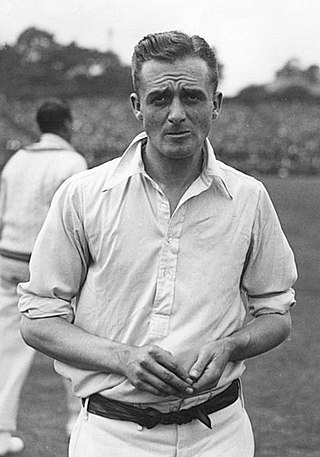
George Gibson Macaulay was a professional English cricketer who played first-class cricket for Yorkshire County Cricket Club between 1920 and 1935. He played in eight Test matches for England from 1923 to 1933, achieving the rare feat of taking a wicket with his first ball in Test cricket. One of the five Wisden Cricketers of the Year in 1924, he took 1,838 first-class wickets at an average of 17.64 including four hat-tricks.
Len Hutton captained the English cricket team in Australia in 1954–55, playing as England against Australia in the 1954–55 Ashes series and as the MCC in other matches on the tour. It was the first time that an England team had toured Australia under a professional captain since the 1880s. After losing the First Test by an innings, they beat Australia 3–1 and retained the Ashes. The combination of Frank Tyson, Brian Statham, Trevor Bailey, Johnny Wardle and Bob Appleyard made it one of the strongest bowling sides to tour Australia, and it was the only team of any nationality to defeat Australia at home between 1932–33 and 1970–71.

The England cricket team toured Australia and New Zealand between October 1962 and March 1963 with a one-match stopover in Colombo, en route to Australia. The tour was organised by Marylebone Cricket Club (MCC) and, in all matches other than Tests, the team was called MCC. In Australia, the tour itinerary consisted of 15 first-class matches, including the five-match Test series against Australia in which The Ashes were at stake. It was the last England cricket tour of Australia where the team travelled by ship.
Variations in published cricket statistics have come about because there is no official view of the status of cricket matches played in Great Britain prior to 1895 or in the rest of the world prior to 1947. As a result, historians and statisticians have compiled differing lists of matches that they recognise as (unofficially) first-class. The problem is significant where it touches on some of the sport's first-class records, especially in regards to the playing career of W. G. Grace.

Ernie Toshack was a member of Donald Bradman's famous Australian cricket team, which toured England in 1948 and was undefeated in their 34 matches. This unprecedented feat by a Test side touring England earned Bradman's men the sobriquet The Invincibles.
The 1954–55 Australians lost 3–1 to the touring England team in the 1954–55 Ashes series. The Australian teams of the 1940s and early 1950s were strong even after the retirement of Don Bradman as many of his great 1948 side remained. Australia had lost only one series since 1932–33, when they lost he Ashes to Len Hutton in the exceptionally close fought 1953 Ashes series, but had played no Test cricket since. They had thrashed John Goddard's West Indian team 4–1 in 1951–52 after his triumphant 3–1 win in England, but had surprisingly been held to a 2–2 series draw against Jack Cheetham's South Africans in 1952–53. The general opinion in Australia was that they would win the return series, especially after the great victory in the First Test. "Although Australian batting was unsound by the old standards the presence of more all-rounders gave them the slightly better chance" wrote E.W. Swanton "all-rounders are said to hold the key to Test matches. Australia had four or five to England's one..."
The 1965-66 Australians drew 1-1 with the touring England team in the 1965-66 Ashes series. They were strong in batting, but weak in bowling and by the end of the series had seven batsmen, an all-rounder, a wicket-keeper and only two specialist bowlers in the team, with the batsman helping out with their part-time bowling skills.
References
- ↑ A facsimile edition was published in 1997, incorporating additional material by David Rayvern Allen.
- ↑ "Brittenden, Dick. The Finest Years: Twenty Years of New Zealand Cricket review" (PDF). Journal of Sport History. LA84 Foundation Digital Archive. 1979. Retrieved 21 December 2012.
- ↑ ghost-written by W. Methven Brownlee
- ↑ Ghost-written for him by Arthur Porritt – Alan Gibson: The Cricket Captains of England, 1989, p51.
- ↑ Our Village